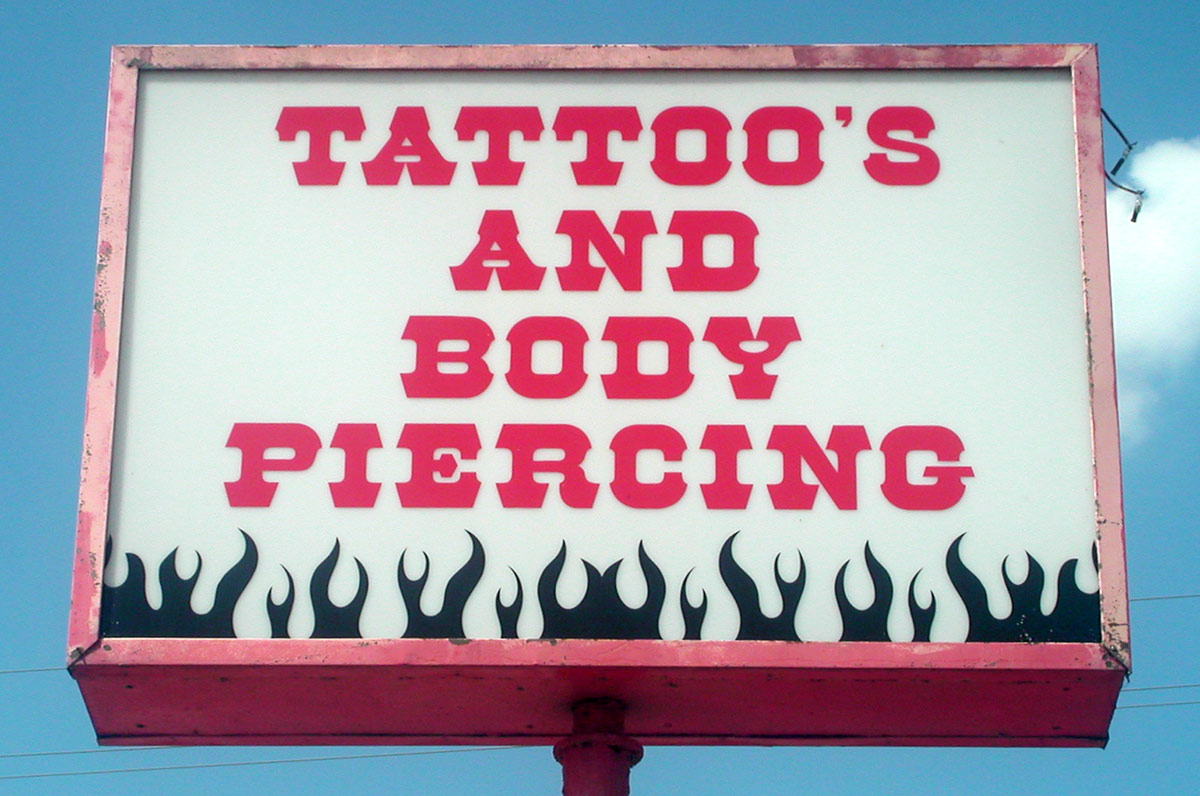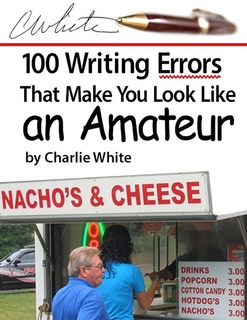
After the overwhelming reaction to my “50 writing errors that make you look like an amateur” post, I couldn’t help but continue my mission of cleansing the Internet of all grammatical malfeasance. So here are 25 more transgressions to avoid if you want to be taken seriously as a writer.
Of course, these are all my personal opinions. They are not rigid rules. The English language is a living thing, evolving over the years with new words and usages added every day. Many items in this list are mere pet peeves of mine. Or I could be just plain wrong.
See also: 50 writing errors that make you look like an amateur
But know this: After editing millions of words, my opinion about writing, grammar and word usage is also evolving, and this is a mere snapshot of my current views. So for now, I’m suggesting if you follow all 75 items on both lists, you’ll be able to pass for a professional writer, circa 2013.
1. “It is what it is.” Oh dear. This phrase is so meaningless you might as well just say “quack! quack! quack!” instead. Everything is what it is. That’s what the meaning of “is,” is, Mr. President. I can understand what people mean by this, saying it’s always been like this and nothing can change it. But write something else, or nothing, instead of a phrase as vacuous as “it is what it is.” All I want to say to that is, “No, it isn’t.”
2. Which/that: There are hard-to-remember rules for this, but here’s the simplest approach: Unless you’re putting a comma before the word “which,” use “that” instead of “which.” Well, unless you’re getting all fancy trying to avoid ending a sentence with a preposition, something up with which I will not put (thanks for that one, Mr. Churchill).
3. No apostrophe needed: I’m certain the astute readership of this post doesn’t need this advice: Don’t make a word plural by adding an apostrophe-“s.” Don’t do these thing’s to word’s. Or go ahead and do them, and you’ll join all the genius signmakers through history, such as the plural-challenged guy at the gas station I visited as a kid. He hand-lettered the following text on a Coke machine: “DRANK’S 45 CENT.”

4. Throw so-and-so under the bus. That bus is getting awfully crowded underneath, judging from the throngs of unfortunate souls thrown there. But throw this hackneyed term under the bus, and then park that murderous heap in the junkyard where it belongs.
5. The “ironic” thing: The grammar Nazis of the Internet jumped all over this a couple of years ago, and it’s shown no sign of abating. In case you haven’t heard, something’s ironic when you’re expecting one thing but something entirely different happens. Before you reach for the word “ironic,” consider the trusty word “coincidence,” according to Webster, describing “events that happen at the same time by accident but seem to have some connection.”
6. You/Your/You’re: Please don’t miss this one. I’m sure most of these you/your errors are typos, because there’s no way anyone would think “Drink you milk” would be correct. For “you’re” and “your,” just remember it works like “its” and “it’s:” “you’re” is a contraction of “you are,” and “your” is the possessive of “you.” And no, the possessive of “you guys” is not “you guys’s.”
7. Totally, seriously, creepily, surprisingly: Too many “ly” words. Best-selling author Stephen King wrote, “The road to hell is paved with adverbs.” Maybe that’s going a bit too far, but this loathsome quartet of teen-slang offenders must go — especially made-up words such as “creepily.” Not surprisingly, but somewhat creepily, I must seriously ask you to totally stop using this drivel.
8. Historic, Historical: Sarah Palin can’t seem to get this straight. “Historical” refers something that happened in history, or something that has to do with the past. “Historic” refers to something that had importance or influence in history.

9. “At the end of the day.” Once when I went to the UK, people were saying this a lot. That was in the ’90s. Here it is 20 years later, and the end of the day seems like it will never get here. People must think dragging out this musty old dishrag sounds cooler than talking about bottom lines or upshots. It doesn’t. None are cool, but the sun has gone down on the end of the day.
10. Lie/Lay/Laid: One of our dear readers wondered how to use these three words, and she reminded me of my grandmother’s easy-to-remember two-word mnemonic: “Hens lay.” That’s because hens have a direct object — understood in this case — eggs. You lie down (no direct object), but you lay yourself down (with the word “yourself” as the direct object). Here’s where it gets weird: “Lay” also functions as the past tense of “lie.” But “laid,” besides having sexual connotations, is the past tense of “lay.” But the past participle of lay is “lain,” such as, “Don Juan has lain with many paramours.” On the other hand, the past participle of “lay” is “laid,” so that means the sentence “I have laid down my arms instead of rising to fight.” Why? Because English. This is making my head hurt. I’m going to have to go lie down. Thanks for your help on this one, Grammar Girl.
11. Tense shifting: Once you’ve started with a particular tense, stick with it. When writing about something that happened in the past, don’t suddenly jump into the present or the future. It’s disorienting. If you’re telling a story, make it past tense. If you’re quoting a source, make it present tense. If you plan to travel to Mars with that group of people that’s not coming back, make it future tense. But stick with one tense as you write, at least within a paragraph.
12. Capitalized Headlines: The New York Times uses “title case,” that is, capitalizing most words in its headlines. So does The Wall Street Journal. But those were the only two newspapers in the top 30 in the U.S. still using title case. All the other top 30 newspapers use “sentence case,” also known as “European style.” It’s up to you if you want to be like the Gray Lady, WSJ and Fox News, but I think it’s time to move on, making headlines sentence case. Those headlines are easier to write, too, relieving you of the burden of those tricky rules of title case capitalization.
13. Who/whom: This one’s tough. Just remember that “who” is used when the person described is doing something, and “whom” is used when that person is having something done to or for him/her. “Ask not for whom the bell tolls.” “Who will ring the bell?”
14. May/might: This is more of a nitpicky preference than a rule, but there is a subtle difference between these two words. “May” fits best when it’s likely something might happen. “Might” works better when something is not as likely to happen.
15. Too many commas: Sometimes commas can be too much of a good thing. Many writers sprinkle commas liberally, whenever they think one might sound good. For example, the sentence “I saw the movie Citizen Kane with my friend Chris” is correct. However, some many people write it like this: “I saw the movie, Citizen Kane, with my friend, Chris.” You don’t need commas in this case unless Citizen Kane is the only movie ever made and Chris is your only friend.
16. More than/over: When you’re writing about a group of things with a numeral attached, use “more than.” For example, “There were more than a dozen dogs in the shelter.” But this is a style point — a matter of personal preference. For instance, sometimes “over” sounds better, such as when you’re writing about how someone is “over 50.” Ahem.
17. “Disinterested:” This doesn’t mean “not interested.” It means impartial, not beholden to any opinion, and not able to gain any personal advantage from an outcome . A disinterested person doesn’t have any horses in this race, dogs in this hunt, or any other animalistic metaphors participating. You want a disinterested judge, referee or arbitrator.
18. “Literally:” Certainly you realize the word “literally” means “actually.” But now a stack of dictionaries and Google say “literally” and “figuratively” are synonyms. Go figure. Let me try it: This is literally going to make my head explode. But I still think using the word “literally” when you mean “figuratively” makes you sound like an amateur.
19. Could of/should of: Of course, no reader of this post, especially someone who’s read this far (beneath the fold on item #19, yay you!), ever gets this one wrong. This one’s only missed by those who have never seen the words “could have” or “should have” written on a page. Thank you for reading this far, by the way. Reading a lot is the secret to good writing.
20. Exclamation points!!!!!! Repeated characters. Don’t!!! Pleeeeeeese don’t!!! Use anything too much and it loses its impact.
21. “Anyways.” I can’t imagine why someone would put an “s” at the end of the word “anyway,” but if you’re one of those who does it, you might have learned this in your childhood and it stays with you. That’s kinda cute. Keep saying it among friends if you must, but don’t write it that way if you want anyone to take you seriously.
22. Less/Fewer: “We have less forested area compared with a generation ago.” Use “less” when referencing a non-countable item or a concept. Use “fewer” when referring to countable items like trees. “We have fewer trees than a generation ago.”
23. Farther/Further: Use “farther” with physical distance, use “further” with intellectual or figurative distance.
24. “Nip it in the butt:” Yes, I heard someone saying this with a straight face. Of course, the saying is “nip it in the bud,” stopping something early before it gets too big to handle. “Nip it in the butt” is funnier, though.
25. Oxford comma wars: Look out, now we’re getting into an even more controversial area. The Oxford comma is placed after the second-to-the-last word or phrase in a series. I’m on the side of leaving it out, even though the joke about it suggests I’m wrong. “With the Oxford comma: ‘We invited the strippers, JFK, and Stalin.’ Without the Oxford comma: ‘We invited the strippers, JFK and Stalin.'” I like to leave out the Oxford comma, because I think it streamlines text, writing and readability. You can write around any situations where you turn politicians into strippers.
See the next 25 pro writing tips of the series here, and the first 50 here
Special thanks to Sue Ryon, Claire 6452, Angela Stevens, Ellis Weiner, David Taylor and Robert Hyry for their brilliant contributions to this list.

Charlie White’s new eBooklet, 100 Writing Errors That Make You Look Like an Amateur, is now on sale! Pick up your copy here or as an iBook on iTunes.
Images: Flickr/Lyndi&Jason, Two-way stairs, Jason Rosenberg, all used under a Creative Commons Attribution-ShareAlike license

I never leave comments at the end of blog posts. Ever. But I just couldn’t resist this time. This column (along with your “50 writing tips” column) are by far the best and funniest grammar columns I’ve ever read. Thanks!!!!!!!! (Just kidding about the exclamation points).
Thanks so much for your kind words. Much appreciated!
The word, if it is a word, “impactful” makes me cringe.
Yeah, that’s another good one for the list. Thanks!
RE: Literally & figuratively – has Google and those dictionaries made antonym a synonym for synonym yet?
Please enlighten us with the correct use of effect/affect as a verb.
I’ll add that to the next one! Thanks.
Regarding #10 can you not make the case that the “yourself/myself” is implied as in I am going to go lay down? It doesn’t sound right to me, and even my dogs will look at people blankly if told to go lay down, but the more I think about it, doesn’t it seem as though you MUST in fact be laying yourself down? And so it would follow that lay is correct with down. As for which and that, chill out. Which was always used quite often and only recently have the Nazis made that comma mandatory. The Brits use it all the time. It just sounds better sometimes and frankly it seems that that has become overused. Dull.
(I always thought that up with which I will not put thing was Twain, but in any case it appears not to have been Churchill http://itre.cis.upenn.edu/~myl/languagelog/archives/001715.html )
Thanks for that, Claudia. Looking through a few sources, I think it’s still not certain if it came from Churchill or not.
My worst: the comma splice.
Pingback: Shinn Sunday Sundry Sandwich
Pingback: Shinn Sunday Sundry Sandwich | The Law Office of Russell Shinn, LLC
Oopsie. # 25, about Oxford comma wars. Check the typo: “readibility.” Or is this just to see if we’re paying attention?